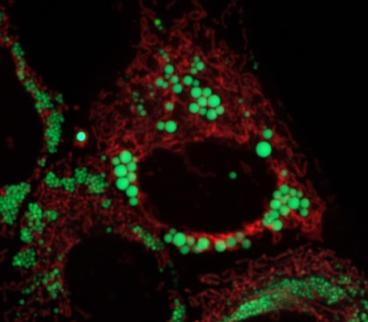
Research

The Mashek laboratory has broad interests in understanding the biochemical basis of metabolic diseases (Type 2 Diabetes, NAFLD, obesity), cancer, and aging, and how interventions such as diet influence these processes. A central theme of our laboratory that connects these diverse research areas is lipid droplet biology. These organelles represent the primary storage form of energy in nearly all cell types and their excess in most tissues is a sign of metabolic stress/dysfunction. Our findings to date have led us down numerous research avenues, discussed below, that further explore the biochemistry and cell biology of lipid droplets in a variety of cell types (liver, muscle, adipose) as well as translational studies tightly intertwined with lipid droplet biology. Our laboratory employs a wide range of experimental techniques ranging from basic biochemistry, molecular biology, enzymology, and cell biology to animal models to clinical trials.
Lipid droplets and the compartmentalization of metabolism and signaling
Lipid droplets interact with numerous organelles, which changes in response to various nutritional or environmental cues. While the purpose of such interactions is not clear, they are speculated to coordinate various metabolic processes. Our laboratory is very interested in defining the spatiotemporal coordination of metabolism, especially in regard to lipid droplets. We are currently employing a wide range of approaches (super resolution microscopy, 3D-EM, proximity labeling/proteomics, metabolomics, etc.) to characterize these interactions and determine how alterations in organelle dynamics leads to disease and aging.
Lipid droplets, lipolysis and aging
Our studies show that lipid droplet breakdown triggers signals that benefits cells, organs and potentially organisms. These findings beg the question “What drives lipid droplet breakdown?” Fortunately, we know! Interventions such as caloric restriction, fasting regiments (intermittent fasting and time-restricted feeding) or exercise are well known to promote lipid droplet breakdown and, to no surprise, are also known to have very positive and wide-ranging health benefits. Thus, we are very interested in defining the importance of lipid droplet breakdown as a critical mediator of these interventions. In addition, the composition lipid droplets appears to be a key factor dictating lipid droplet signaling. As a result, we are very interested in determining how different dietary fats, which alter lipid droplet composition, interact with fasting to influence disease development and the aging process.
Lipid droplets and inflammation
Numerous studies have linked lipid droplet accumulation to inflammation. Since chronic inflammation underlies most diseases, we are keen on understanding the detailed mechanisms through which changes in the protein or lipid composition of lipid droplets regulate inflammation. In particular, we are identifying and characterizing the proteins that couple or uncouple lipid droplets from inflammation. In addition, numerous studies are ongoing to define how lipid droplet-mediated regulation of inflammation drives the development of various metabolic diseases and contributes to the aging process.